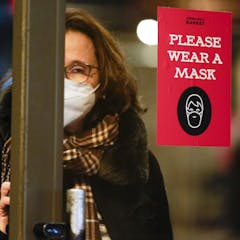
Artikel-artikel mengenai Vaccine mandates
Menampilkan 1 - 20 dari 78 artikel

Here’s what the court found – and what this means for future legal challenges to vaccine mandates across Australia.

Mandates were meant to ensure continuity of public services during the pandemic. But a new study suggests they had limited impact on vaccination rates, while significantly hurting careers and eroding trust.

Vaccine policies fall on a spectrum, from mandates to recommendations. Deciding what to use and when is not so much a science but a balancing act between personal autonomy and public good.

Albertans struggled during the COVID-19 pandemic, but the Alberta Viewpoint Survey shows there’s a fragile optimism about the future as a provincial election approaches.

Danielle Smith’s win in the UCP leadership race follows the populist playbook. Will her time in office be a brief interlude, or the start of a significant challenge to national unity?

Fair Work Commission rulings on employer vaccination mandates highlight the need for fair processes.

We expect businesses to be more socially and environmentally responsible by minimizing greenhouse gas emissions and eliminating harmful business practices — why don’t we do the same for COVID-19?

Many countries are winding back COVID-19 restrictions, but governments should be continuing to promote the importance of voluntary mask use and catching up outdoors.

Queensland is removing the requirement to be vaccinated before entering cafes, pubs, galleries and other public spaces. But this could affect public attitudes about the importance of vaccination.

The “freedom convoy” was a culmination of years of persistent mobilization by far-right networks whose growth intensified as they digitally tapped into COVID-19 related grievances.

The constantly changing COVID-19 rules can be frustrating. But this pandemic is like no other public health crisis in history. It is better to think of the virus and US responses the way we think about hurricanes.

Vaccine passports became one of the most divisive issues of the COVID-19 pandemic. These policies were affected not only by public opinion but by new variants and changing goals for herd immunity.

Vaccine passes have outlived their usefulness, at least for now. But as New Zealand’s Omicron wave begins to subside, other public health measures remain vitally important.

New Zealand has more laws about respecting the flag than about protecting parliament and its grounds. The 23-day occupation in Wellington showed how much needs to change.

There is a difference between ‘negative liberty’ and ‘positive liberty’. Real freedom involves unavoidable trade-offs between the two.

If what you’re reading seems too good to be true, it probably is.

Now that Omicron infection is widespread, the government could improve trust by phasing out travel restrictions and border isolation and reviewing vaccine mandates to ensure they are proportionate.

Vaccine passports can and have been used to increase surveillance by governments. Transparency and accountability are crucial for protecting the privacy of civilians.

The Canadian Constitution compels a proportionate weighing of all Charter rights against the threat of COVID-19, meaning that individual freedom is not absolute.

Appropriating slogans associated with other causes creates false equivalencies and causes confusion.
